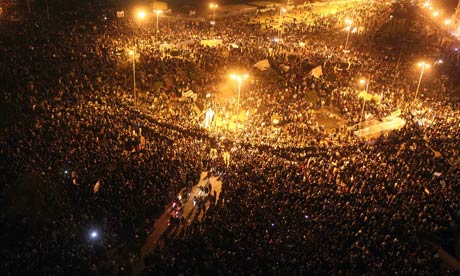Egypt's government offers to resign as protests grow
Jack Shenker in Cairo
The Guardian, Tuesday 22 November 2011/Guardian
Generals have opened crisis talks with civilian political leaders after widespread violence continued to plunge Egypt into turmoil
 Egypt's cabinet tendered its resignation as clashes raged in Tahrir Square between police and protesters demanding democratic change in the country. Photograph: Mahmud Khaled/AFP
Egypt's ruling generals have opened crisis talks with civilian political leaders after the entire government tendered its resignation and widespread street violence continued to plunge the country into turmoil.
Egypt's cabinet tendered its resignation as clashes raged in Tahrir Square between police and protesters demanding democratic change in the country. Photograph: Mahmud Khaled/AFP
Egypt's ruling generals have opened crisis talks with civilian political leaders after the entire government tendered its resignation and widespread street violence continued to plunge the country into turmoil.
At least 33 people have been killed and more than 2,000 injured following a third day of clashes in Cairo and beyond, with confirmation emerging for the first time that security forces have been firing live ammunition at demonstrators.
With under a week to go until nationwide parliamentary elections are due to begin, beleaguered interim prime minister Essam Sharaf announced he and his cabinet were willing to step down in a bid to quell the growing unrest. But the offer – which at midnight on Monday had yet to be accepted by the military junta – appeared unlikely to appease demonstrators who continued to flock to city centres across the country demanding that the Supreme Council of the Armed Forces (Scaf) cede power and hand Egypt over to civilian rule.
In a late-night statement to the nation, the army generals appealed for calm and expressed 'deep regret' for the deaths of protesters. But as fierce fighting between revolutionaries and armed police showed no sign of letting up and video footage of police and army brutality against unarmed demonstrators continued to circulate, their calls for self-restraint seemed destined to fall on deaf ears.
"The Scaf only have two choices – they obey the will of the people, or Egypt burns," said Ramy el-Swissy, a leading member of the April 6th youth movement which is one of several organisations that has announced plans for a 'million-man' occupation of Tahrir today.
A broad coalition of revolutionary movements from across the political spectrum, including leftist, liberal and Islamist organisations, also threw their full weight behind the protests. "We confirm our readiness to face all the forces that aim to abort the revolution, reproduce the old regime, or drag the country into chaos and turn the revolution into a military coup," said a joint statement by 37 groups.
The Muslim Brotherhood, Egypt's largest organised political movement, added its voice to the chorus of discontent, accusing Scaf of contradicting 'all human, religious and patriotic values' with their callousness and warning that the revolution that overthrew former president Hosni Mubarak earlier this year was able to rise again.
"What happened is a heinous crime, expressing a dark deep desire, an attempt to lure faithful patriotic citizens in order to crush them and spread chaos everywhere," said the Brotherhood in a statement. "All this proves that there are certain parties who have no problem burning Egypt, our homeland, and killing young people in order to herd the entire public into blind obedience, into tyranny and corruption and slavery yet again."
The organisation also announced it was temporarily suspending all electoral activities, but unlike many liberal and leftist parties it has yet to cancel its campaign.
Earlier in the day a last-ditch effort by the junta to stem the violence by offering concessions to their critics – including the passing of a long-awaited "treachery law" that would bar former members of Hosni Mubarak's now-disbanded ruling party from running in the upcoming elections, which are now less than a week away – appeared only to galvanise resistance, as did the later announcement of Sharaf's proposed resignation.
"The Egyptians have accepted being beaten, arrested and lied to by their political leaders for sixty years, but after everything we went through, we are not going to accept it anymore." said Gamila Ismail, a parliamentary candidate who has now suspended her campaign and joined the protests in central Cairo.
"The message being sent to Scaf by Egypt's youth is: 'shoot me in the eye, burn away my flesh, and then I will go and fix myself up at the field hospital and come straight back to the struggle'," she added. "They used to dream of cars, houses and leaving the country; now they dream of standing in Tahrir. The age of authoritarianism is over, no one can tell the Egyptians what to do anymore." ...<cont>